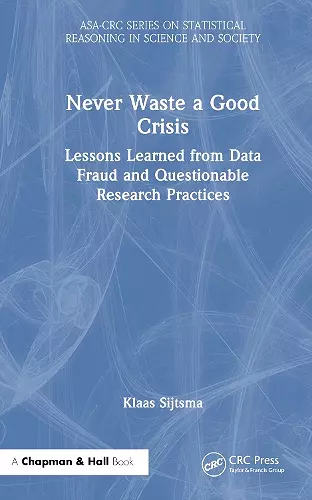Never Waste a Good Crisis
Lessons Learned from Data Fraud and Questionable Research Practices
Format:Hardback
Publisher:Taylor & Francis Ltd
Published:15th Jun '23
Currently unavailable, and unfortunately no date known when it will be back
This hardback is available in another edition too:
- Paperback£31.99(9781032183749)

This book covers statistical consequences of breaches of research integrity such as fabrication and falsification of data, and researcher glitches summarized as questionable research practices. It is unique in that it discusses how unwarranted data manipulation harms research results and that questionable research practices are often caused by researchers’ inadequate mastery of the statistical methods and procedures they use for their data analysis. The author’s solution to prevent problems concerning the trustworthiness of research results, no matter how they originated, is to publish data in publicly available repositories and encourage researchers not trained as statisticians not to overestimate their statistical skills and resort to professional support from statisticians or methodologists.
The author discusses some of his experiences concerning mutual trust, fear of repercussions, and the bystander effect as conditions limiting revelation of colleagues’ possible integrity breaches. He explains why people are unable to mimic real data and why data fabrication using statistical models stills falls short of credibility. Confirmatory and exploratory research and the usefulness of preregistration, and the counter-intuitivenature of statistics, are discussed.
The author questions the usefulness of statistical advice concerning frequentist hypothesis testing, Bayes-factor use, alternative statistics education, and reduction of situational disturbances like performance pressure, as stand-alone means to reduce questionable research practices when researchers lack experience with statistics.
An interview with the author can be found here: https://www.tilburguniversity.edu/magazine/overview/former-rector-sijtsma-turn-statistician-fight-fraud-and-sloppiness.
"This excellent book is written by the dean replacing his predecessor Diederik Stapel, who had been unmasked as large scale data fabricator. The title of the book says it all: Klaas Sijtsma didn’t waste the good crisis his university was in. The book contains an engaging mixture of the personal story of having to control the damage done by the Stapel case, Sijtsma’s encounters with questionable research questions during his career in applied statistics and psychometrics, and a strong plea to improve research quality. That mix works well. I especially like the insightful explanations about why statistics is difficult for most researchers and how easily they’re let astray by their intuition. It’s also explained clearly why transparency about the research methods used and the data obtained is essential for research to be trustworthy. Taking everything together the book is a convincing plea to engage in open methods and open data, and to involve methodologists and statisticians in research more intensively. Also leaders of research institutes can learn a lot from the book about how to make their organization less vulnerable to research fraud and methodological errors."
- Lex Bouter, Professor Emeritus of Methodology and Integrity, Vrije Universiteit Amsterdam
ISBN: 9781032189017
Dimensions: unknown
Weight: 453g
208 pages